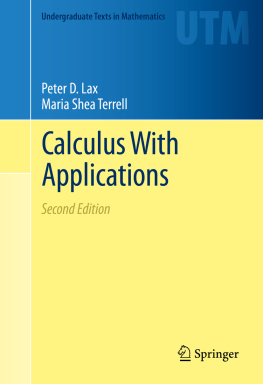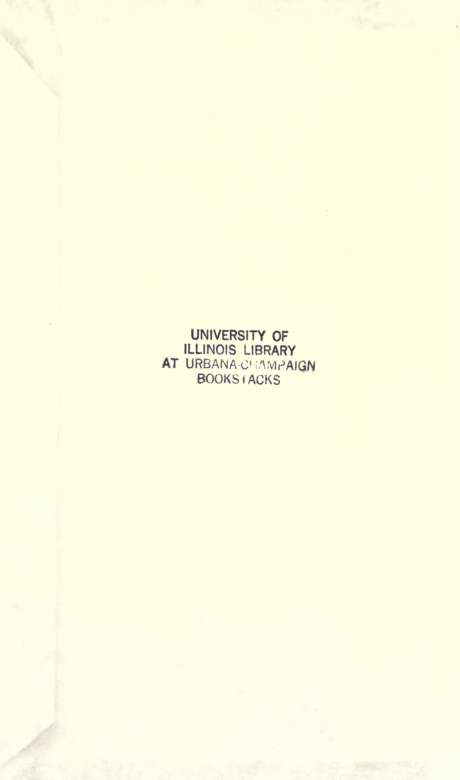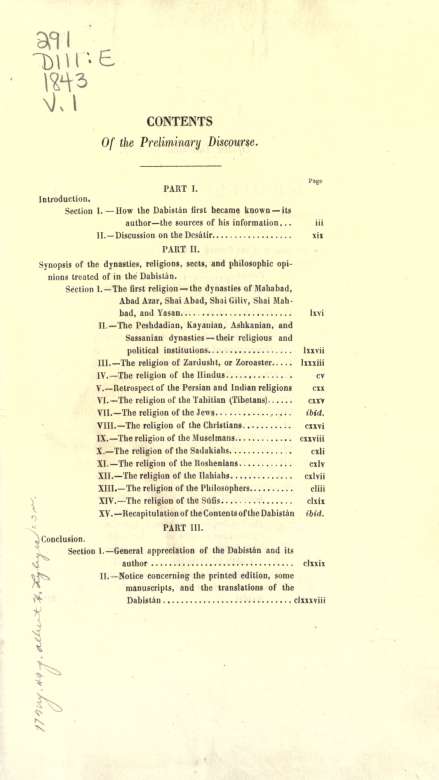This book made available by the Internet Archive.
TO
JHemorg
OF
THE RIGHT HONORABLE
Etc,, etc , etc.
CONTENTS
Of the Dabistdn (vol. I.)
Page
Introduction of the Author 1
CHAPTER I.
Of the religion of the Parsian 4
Section I.Tenets and ceremonies observed by the Sipasian and
Parsian 5
Description of the worship rendered to the seven planets, according to the Sipasian faith 35
II.Description of the Sipasian sect 87
III.The laws of the Paiman-i-Farhang and the Hirbed Sar 147
Descriptions of the gradations of Paradise 150
Description of the infernal regions 152
IV.An account of the Jamshapian sect 193
V.The Samradian sect 195
VI.The tenets of the Khodaiyan 201
VII.The system of the Radian ibid.
VIII.The Shidrangian creed 203
II.The Paikarian creed ibid.
X.The Milanfan system 204
XLThe system of the followers of Alar 206
XII.The Shfdanian faith 207
XIII.The system of the Akhshiyan sect. ibid.
XIV.The followers of Zardusht 211
Account of the precepts given by Zardusht to the
king and all mankind 260
The Sad-der, or " the hundred gates" of Zardusht 310 Enumeration of some advantages which arise from the enigmatical forms of the precepts of Zar
dusht's followers ,.. 351
Summary of the contents of the Mah-zend 353
XV.An account of the tenets held by the followers of
PRELIMINARY DISCOURSE.
PART I. INTRODUCTION.
I. How THE DABISTAN FIRST BECAME KNOWN ITS
AUTHOR THE SOURCES OF HIS INFORMATION..
It is generally known that sir William Jones was the first who drew the attention of Orientalists to the Dabistan. This happened five years after the beginning of a new era in Oriental literature, the foundation of the Asiatic Society of Calcutta by that illustrious man. It rnay not appear inopportune here to revive the grateful remembrance ol one who acquired the uncontested merit of not only exciting in Asia and Europe a new ardor for Oriental studies, but also of directing them to their great objects MAN and NATURE ; and of endeavoring, by word and deed, to render the attainment of languages conducive to the required knowledge equally easy and attractive.
Having, very early in life, gained an European reputation as a scholar and elegant writer, sir William Jones embarked' for the Indian shores with vast projects, embracing, with the extension of science, the general improvement of mankind. 2 Four months after his arrival in Calcutta, 3 he addressed as the first president of the Asiatic Society, a small but select assembly, in which he found minds responsive to his own noble sentiments. A rapid sketch of the first labors of their incomparable leader, may not be irrelevant to our immediate subject.
In his second anniversary discourse, 4 he proposed a general plan for investigating Asiatic learning, history, and institutions. In his third discourse, he traced the line of investigation, which he faithfully followed, as long as he lived in India, in his annual public speeches : he determined to exhibit the prominent features of the five principal nations of Asia - the Indians, Arabs, Tartars, Persians, and Chinese. After having treated in the two following years of the Arabs and Tartars, he considered in his sixth discourse 5 the Persians, and declared that he
1 In April, 1783.
2 He landed at Calcutta in September, 1783.
3 In January, 1784.
4 Delivered in February, 1785. s In February, 1789.
INTRODUCTION.
had been induced by his earliest investigations to believe, and by his latest to conclude, that three primitive races of men must have migrated originally from a central country, and that this country was Iran, commonly called Persia. -Examining with particular care the traces of the most ancient languages and religions which had prevailed in this country, he rejoiced at " a fortunate discovery, for " which," he said, " he was first indebted to Mir '* Muhammed Hussain, one of the most intelligent " Muselmans in India, and which has at once dissi-** pated the cloud, and cast a gleam of light on the " primeval history of Iran and of the human race, " of which he had long despaired, and which could " hardly have dawned from any other quarter;" this was, he declared, " the rare and interesting " tract on twelve different religions, entitled the
Sir William Jones read the Dabistan for the first time in 1787. I cannot refrain from subjoining here the opinion upon this work, which he communicated in a private letter, dated June, 1787, to J. Shore, esq. (afterwards lord Teignmouth); he says: "The * ' greatest part of it would he very interesting to a " curious reader, but some of it cannot be translated. " It contains more recondite learning, more enter
1 The works of sir William Jones, with the lite of the author, by lord Teignmouth, in 13 vols. Vol. 111. p. HO. 1807.
** taining history, more beautiful specimens of poetry, ** more ingenuity and wit, more indecency and blas-*' phemy, than I ever saw collected in a single vo-** lume; 1 the two last are not of the author's, but '' are introduced in the chapters on the heretics and ' " infidels of India. 2 On the whole, it is the most " amusing and instructive book I ever read in Per-" sian." 3
We may suppose it was upon the recommendation of sir William Jones, that Francis Gladwin, one of the most distinguished members of the new Society, translated the first chapter of The Dabistdn, or ' * School of Manners," which title has been preserved from due regard to the meritorious Orientalist, who first published the translation of a part of this work. The whole of it was printed in the year 1809, in Calcutta, and translations of some parts of it were published in The Asiatic Researches.* It is only at present, more than half a century after the first public notice of it by sir W. Jones, that the version
1 I shall hereafter give some explanations upon this subject.
2 There appears in the printed edition no positive ground for the opi-nion above expressed; we find, however, frequent repetitions of the same subject, such as are not likely to belong to the same author; we know, besides, that additions and interpolations are but too common in all Oriental manuscripts.
3 The Persian text, with the translation of the first chapter, appeared in the two first numbers of the New Asiatic Miscellany. Calcutta, 1789. This Knglish version was rendered into German by Dalberg, 1809.
4 These translations are mentioned in the notes of the present version.
INTRODUCTION. Vll
of the whole work appears, under the auspices and at the expense of the Oriental Translation Committee of Great Britain and Ireland.


















